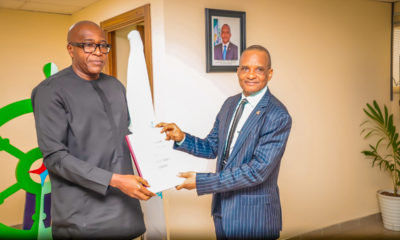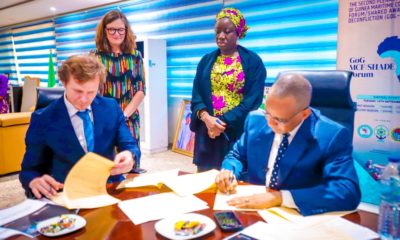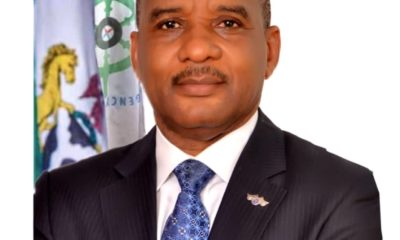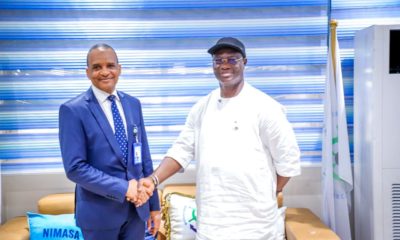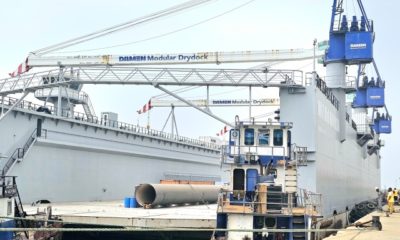Maritime
NIMASA Unveils Service Charter In Move To Redefine Service
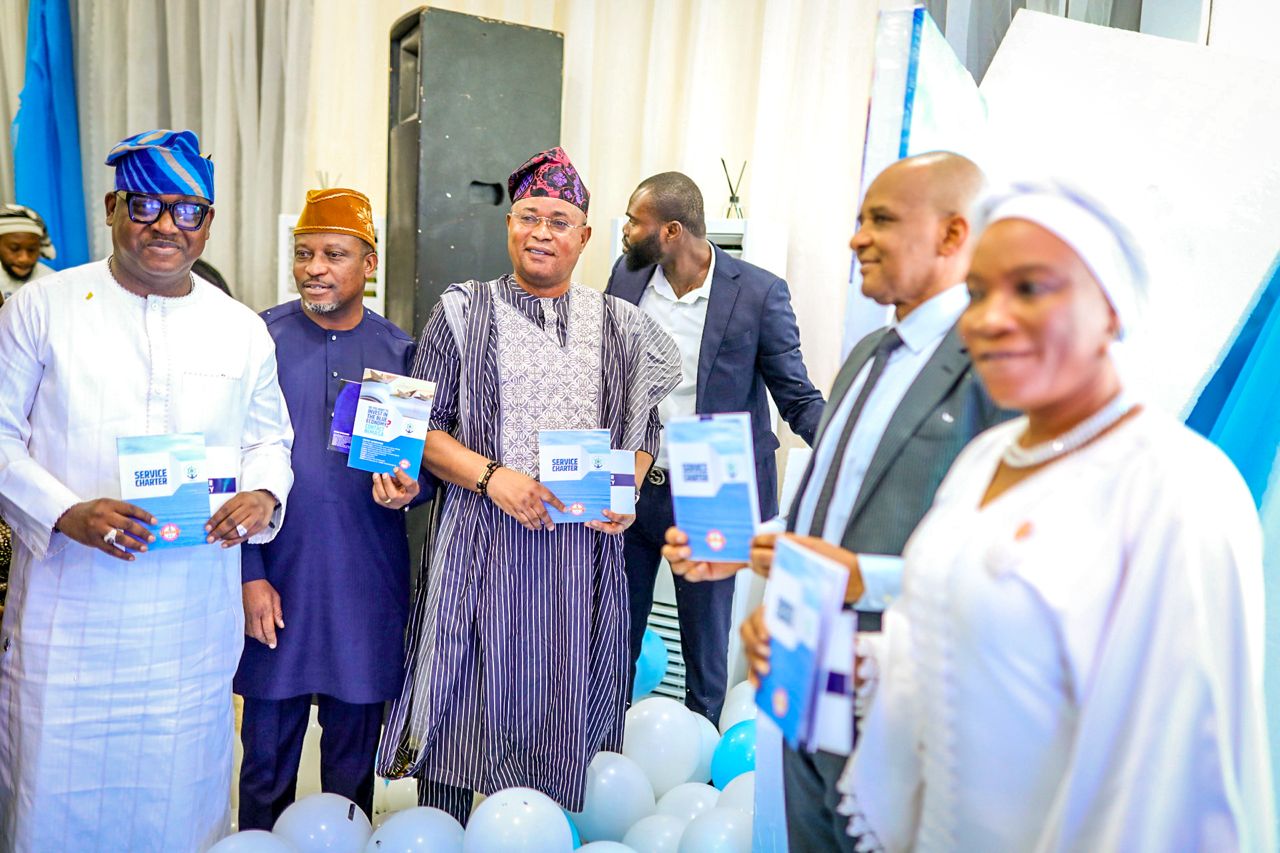
The Nigerian Maritime Administration and Safety Agency (NIMASA) has launched its Service Charter, renewing its performance bond in the service of the country, the maritime sector, and its stakeholders.
The Assistant Director, Public Relations, NIMASA, Osagie Edward, revealed this in a statement in Lagos on Wednesday.
He divulged that the Minister of Marine and Blue Economy, Adegboyega Oyetola, commended the Management of NIMASA for her commitment to improved service delivery in line with the direction of the President Bola Ahmed Tinubu led administration.
Oyetola, who was represented by the Director, Maritime Safety and Security, Babatunde Bombata, commended NIMASA for embracing technological advancements, modernizing its operations, thereby improving its productivity and fostering sustainable growth in the maritime sector.
He also congratulated NIMASA on its Service Charter, calling it “a testament to NIMASA’s dedication to providing world-class service to maritime stakeholders, and fostering an environment that encourages sustainable growth in the Marine and Blue economy.
Oyetola said, “This Charter is not just a document, it symbolizes a renewed commitment to service excellence, responsiveness and continuous improvement within NIMASA.
“The Service Charter represents a public bond by NIMASA, to provide high quality, efficient and transparent services to stakeholders in the maritime industry and the general public.
“It is also a tool for accountability that sets out clear expectations for stakeholders and provides a mechanism for the Agency to measure its performance.”
The Minister recalled that the Agency had recently entered into a Performance Bond agreement for Ministerial Deliverables with the Ministry of Marine and Blue Economy.
He noted that among the three Management Scorecard Priorities outlined in the MDA Performance Management System (MPMS) is the ‘Service Wide Priorities’ which is aimed at enhancing service delivery throughout the maritime sector.
Earlier, the Chairman, Senate Committee on Marine Transport, Senator Wasiu Eshilokun Sanni, assured that the committee would work closely with NIMASA to provide maximum cooperation in appropriating funds for the Agency to achieve its objectives.
He urged NIMASA as a matter of urgency, to adhere to all service provisions, to become the best in Africa and the World by extension.
On her part, the National Coordinator SERVICOM Office, Presidency, Nnenna Akajemeli, noted that NIMASA is now a model in service delivery and the SERVICOM office in the Presidency has now made NIMASA a reference Agency for others in the country.
In her words, “Let me inform you all that we at the SERVICOM office in the Presidency are proud of the achievements of NIMASA in terms of Service delivery.
“The NIMASA Customer Experience Center is now a model we recommend to all other Agencies of government in Nigeria. We actually advise them to visit NIMASA Experience Centre and replicate same so the connectivity between the Government and the people can improve”.
In his welcome address, the DG, NIMASA, Dr. Bashir Jamoh, stated that the Service Charter was a significant milestone in the Agency’s journey to improve on her commitment in redefining service delivery.
He said, “Service Redefined, encapsulates our commitment to transforming the way we serve our stakeholders, the maritime community and the Nigerian people as a whole. It reflects our dedication to elevating the standards of service delivery, embracing innovation, and fostering a culture of excellence within our organization.
“Our Service Charter outlines our promises to all those who interact with NIMASA, whether they are Ship Owners, Seafarers, Port Operators, or members of the public. It sets clear standards for the quality of service they can expect from us, and establishes mechanisms for feedback and continuous improvement.”
Other dignitaries present at the launch included the Deputy Chairman, House of Representatives Committee on Maritime Safety Education and Administration, Hon. Uduak Odudoh, Rector, Maritime Academy of Nigeria, Oron, Commodore Duja Effedua (rtd.), among others.
Maritime
Maritime Stakeholders Back Bill For Nigeria Coast Guard At Public Hearing
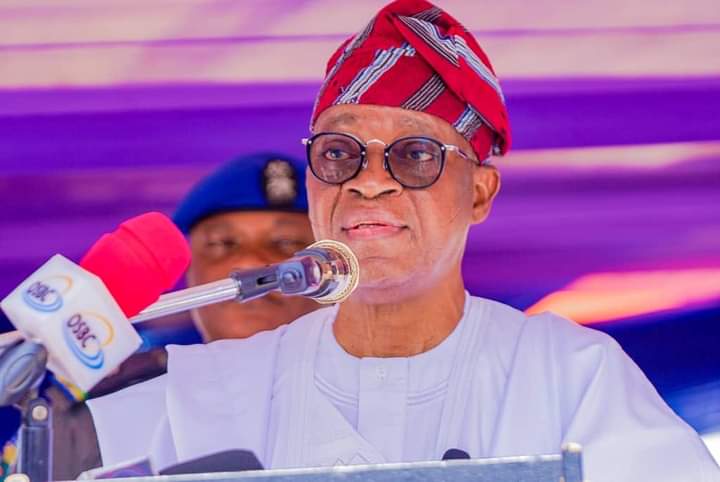
Stakeholders and experts in Nigeria’s maritime sector have expressed support for the Coast Guard Bill before the National Assembly, with many describing the proposed legislation as a boost to the federal government’s efforts in securing the maritime space.
At a public hearing convened by the Senate Committee on Marine Transport to discuss the bill for the establishment of the Nigeria Coast Guard (NCG), stakeholders presented varying views, with the majority supporting the creation of the NCG.
The majority of presentations voiced strong support for the establishment of the Coast Guard, with notable endorsements from prominent figures including Dr. Olisa Agbakoba, SAN; Dr. Ade Dosunmu, MON, former Director General of NIMASA; Mrs. Jean Anishere, SAN, representing the Nigeria Bar Association; and Rear Admiral Ekwerre U. Ekwerre (Rtd), former Flag Officer Commanding the Training Command of the Nigerian Navy.
ALSO READ: Like America, Like Ghana: Opposition Defeats Ruling Party In Presidential Election
Dr. Olisa Agbakoba described the bill as timely but emphasized the need for professional input to address certain concerns within the draft. He expressed his willingness to assist in this process. Dr. Ade Dosunmu offered full support for the bill, suggesting that the Nigerian Navy should focus on blue-water operations and national defense against external threats, while the Coast Guard should address maritime crimes and incidents along Nigeria’s extensive 855-kilometer coastline using more adaptable resources. He referenced successful maritime nations such as India, Singapore, China, the United States, Japan, Egypt, Morocco, and the United Arab Emirates, all of which have well-defined roles for both the Navy and Coast Guard.
However, Dr. Dosunmu cautioned against assigning functions such as hydrography and oceanographic research to the Coast Guard, as these responsibilities are already managed by other agencies, and incorporating them could divert focus from the Coast Guard’s primary mission.
Jean Anishere, SAN, articulated her support for the bill while highlighting certain ambiguities that must be resolved before it can be enacted. She pointed out specific provisions in the bill that require clarification and further refinement.
Retired Rear Admiral Ekwerre U. Ekwerre addressed concerns raised by the Nigerian Navy and advocated that the Navy should concentrate on defense, showcasing military strength, and conducting diplomatic operations within territorial waters and the Exclusive Economic Zone (EEZ). He asserted that the Coast Guard should be responsible for enforcing maritime laws in the nation’s inland waters.
In summary, while the majority of stakeholders endorsed the establishment of the Nigeria Coast Guard, they also called for careful consideration of the bill’s provisions to ensure clarity and effectiveness in its implementation.
Maritime
How Innovative Financing Would Aid Africa’s Maritime Sector – NIMASA DG
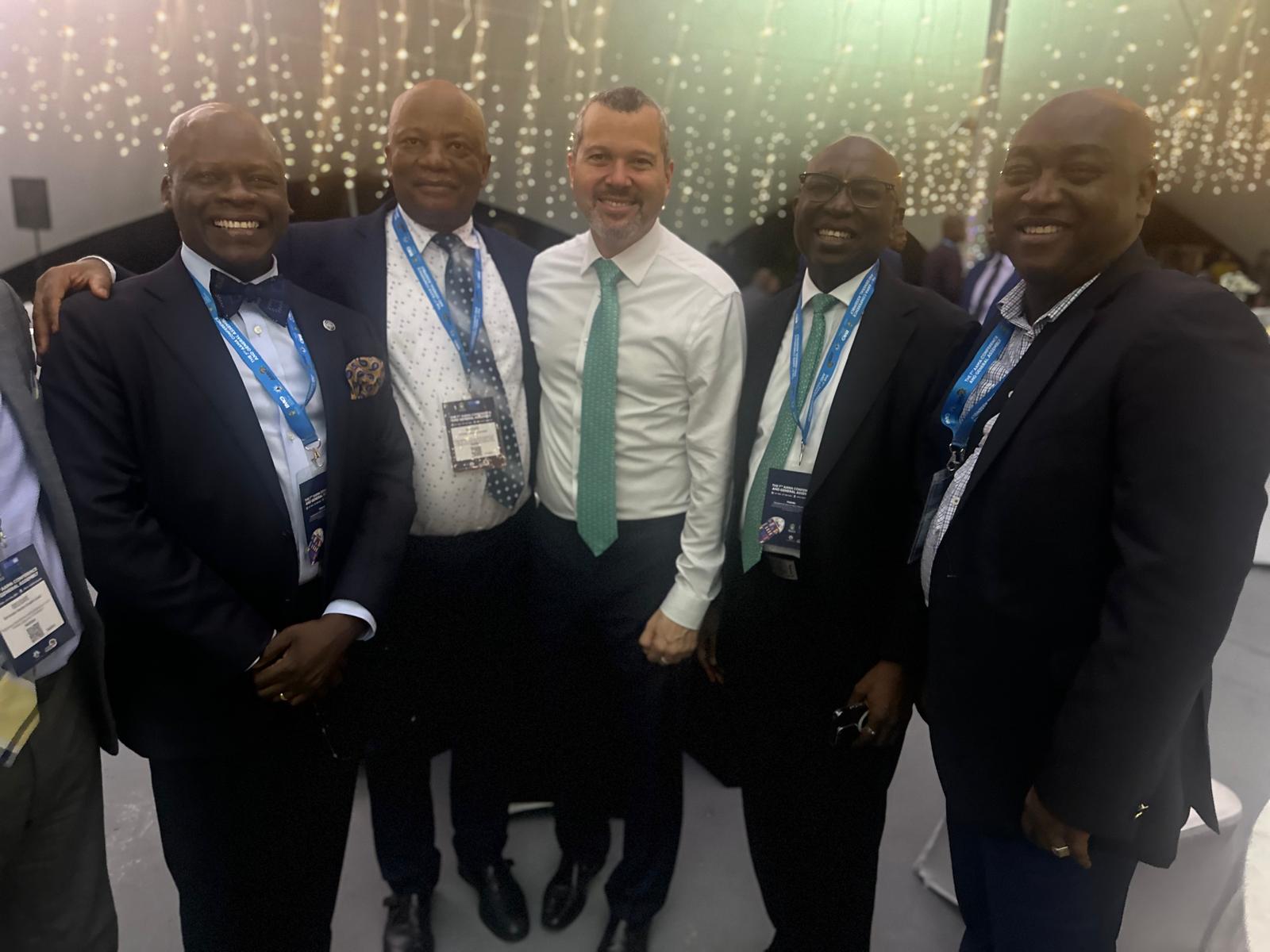
Innovative financing models have been identified as the vital catalyst for achieving sustainable development in the African Maritime industry.
The Director General of the Nigerian Maritime Administration and Safety Agency (NIMASA), Dr. Dayo Mobereola, made the declaration at the 7th Association of African Maritime Administrations (AAMA) conference in Dar es Salaam, Tanzania.
He assured attendees of Nigeria’s commitment to advancing a future where Africa’s maritime sector thrives sustainably.
In his words, “Nigeria is committed to collaborating on technology and innovation to enhance safety, security, decarbonization, and the marine environment for a sustainable future.”
According to him, the conference presents a pivotal opportunity to address our shared challenges, particularly those related to sustainable energy, regional security, and economic growth.
ALSO READ: Tinubu, Ramphosa Co-Chair Bi-National Commission’s 11th Session
“We are here to advocate for innovative financing models and international support that will facilitate sustainable growth. As Nigeria pursues infrastructure development and digital transformation within our maritime sector, we call on our regional and international partners to support these efforts through technical and financial backing.
“Our priorities at the AAMA conference include exploring collaborative avenues to enhance maritime safety and security. By reinforcing our adherence to frameworks like the Djibouti and Yaoundé Codes of Conduct, we aim to solidify Nigeria’s role in combating piracy and maritime crime across West Africa,” he stated.
The AAMA was established to lay a firm foundation for regular consultations, enabling African maritime administrations to build joint positions on issues of common concern in the maritime sector.
When Nigeria hosted the 3rd AAMA conference in 2017, a master plan was developed outlining the measures necessary to advance the maritime agenda as envisioned in the African Maritime Transport Charter. The Association has also created a platform to strengthen cooperation at the regional, continental, and international levels, harmonizing policies and goals essential for the growth of the African maritime sector.
Maritime
Oyetola Counts On Nat’l Marine and Blue Economy Policy To Chart New Course For Dev’t

The Honourable Minister of Marine and Blue Economy, Adegboyega Oyetola is of the view that a National Policy on Marine and Blue Economy is essential for the development of the Nigerian maritime sector.
Biztellers reports that Oyetola shared the view, on Tuesday, while declaring open a stakeholders’ validation session aimed at developing the National Policy on Marine and Blue Economy in Nigeria, in Lagos.
The former Osun State Governor emphasized that the National Policy will create a sustainable pathway for economic growth in fisheries, aquaculture, renewable energy, tourism, and seabed mining, while also ensuring environmental sustainability.
He further noted the need for a robust National Policy to address challenges in the sector, including environmental degradation and illegal activities such as Illegal, Unreported, and Unregulated (IUU) fishing.
ALSO READ: Obi Congratulates NNPC Ltd On Port Harcourt Refinery
In his words, “A robust National Policy will ensure that we address these issues through a comprehensive framework that aligns with international best practices while safeguarding our marine resources for future generations.
“It is worth noting that Nigeria has achieved notable progress in maritime governance, including the ratification and domestication of international protocols and conventions. These measures have strengthened our safety and security framework, resulting in a remarkable three-year period with zero incidents of piracy in our waters. Nonetheless, the recurring boat mishaps underscore the pressing need for immediate action.
“This policy seeks to implement comprehensive strategies to ensure the safety of all waterways. However, challenges such as the recent spate of boat mishaps demand urgent attention. Consequently, this policy aims to establish comprehensive measures that will enhance safety across our waterways.
“As we develop this policy, the Ministry remains committed to repositioning Nigeria as a dominant player in the marine and blue economy, both regionally and globally. We are also pursuing Nigeria’s candidacy for election to Category C of the International Maritime Organization (IMO), which underscores our determination to strengthen our voice in global maritime governance”.
In his welcome address, the Permanent Secretary of the Ministry, Olufemi Oloruntola, noted that the validation workshop is a key step in shaping the National Policy on Marine and Blue Economy — a framework designed to address Nigeria’s specific needs and aspirations while embracing sustainable development principles. “It provides an opportunity for stakeholders to review, refine, and enrich the draft policy through a participatory and inclusive approach,” he said.
The draft policy, which consists of nine parts, offers an elaborate overview of our country’s marine and blue economic endowments and their current state. It affirms our mandate, vision, and mission, setting the stage for the policy’s objectives and aspirations. It further dissects these aspirations into five broad parts of legal and institutional framework; maritime transport, trade and shipping; fisheries and aquaculture; marine abiotic resources; and marine innovation and technology. It also identifies a range of cross-cutting issues and concludes with an assessment of stakeholders to support the implementation structure. Overall, it is a comprehensive document.
Also present at the event were the Chief Executive Officers of all the agencies under the Ministry, including Dr. Dayo Mobereola, Director General, Nigerian Maritime Administration and Safety Agency; Abubakar Dantsoho, Managing Director, Nigerian Ports Authority; Barrister Akutah Pius, Executive Secretary, Nigerian Shippers Council; and Bola Oyebamiji, Managing Director, National Inland Waterways Authority.
Other attendees included Funmi Folorunsho, President, African Shipowners Association; Engr. Greg Ogbeifun, Managing Director, Starz Marine; and the President, National Association of Stevedoring Companies, among other stakeholders.

